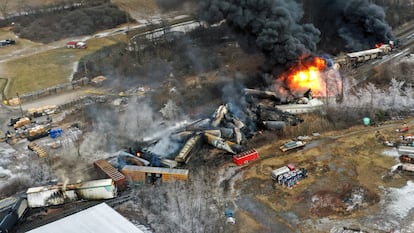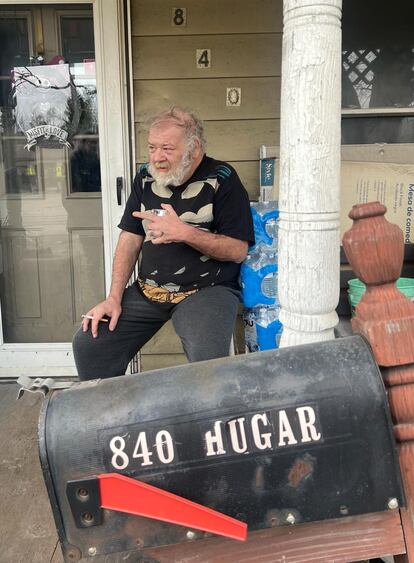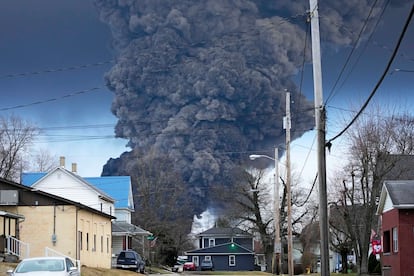A town derailed: The toxic Ohio train crash that split East Palestine in two
A year ago, a train loaded with dangerous substances went off the tracks in this quiet town. Today, residents are divided between those who want to turn the page on the trauma and those who are still searching for answers


At 8:54 p.m. on February 3, 2023, William Hugar was at his home just outside of East Palestine, Ohio, doing what he loves most: watching videos on YouTube. He heard a “very loud noise,” but continued doing his thing. His years as a waiter in a “very stressful” bar taught him to behave like “a master of calm in the middle of chaos.” Only the insistent sound of sirens made him go out into the street. That was when he learned that, a few feet from his backyard, a train loaded with toxic substances had derailed. He also quickly learned that nothing would ever be the same in the town of 4,700 inhabitants on the border with Pennsylvania. One year later, residents are still divided between those who want to turn the page… and those who are still looking for answers.
A year later, there’s still noise outside of Hugar’s house. It’s made by the cleaning crews, who are paid by Norfolk Southern Railway, the company responsible for the accident. The workers are on the job “24 hours a day, seven days a week” to clean up a huge portion of contaminated land. According to the Environmental Protection Agency (EPA), 177,000 tons of solid waste and 166 million tons of wastewater have been removed. “There are people who have left town,” Hugar tells EL PAÍS. “Would I have followed them if I had the money? It’s possible. Will I get cancer in a few years as a result of [staying]? There’s no way of knowing.”
On the frigid night of the derailment, Zsuzsia Gyenes followed authorities’ orders to stay at her home, located about a mile from ground zero. At around 3 a.m., she smelled a “penetrating chemical smell, like a nail salon.” Soon, she recalls, her nine-year-old son became “violently ill.”
“We only knew that there had been an accident… not that the train was loaded with those substances,” she explained this past Friday in a phone interview. Even though she wasn’t in the area where evacuation orders were immediately given, Gyenes took her child, who suffers from asthma, and went to a hotel only with what she was wearing. A year and several hotel changes later, they live in Pennsylvania, an hour’s drive away from East Palestine. They still haven’t returned home.

In the 38 cars of the convoy of 150 (almost two miles long) that left the track after one of them caught fire due to a bearing becoming overheated, carcinogenic chemicals and combustible materials were being transported. One of these substances was vinyl chloride, which is used to manufacture PVC. It appeared two months later in a urine test taken by Gyenes’ son. There were also substances that, in the past, were used in the manufacturing of chemical weapons, such as phosgene. This was one of the products that was released into the air, soil and surface waters with the controlled burn that the authorities decided to carry out to avoid even worse effects on the following Monday after the crash.
That controversial measure is still under scrutiny. According to those who criticize the management of the disaster and who belong to an organization called the Unity Council, the decision was taken in haste. Norfolk Southern also hid the complete list of what the train was transporting for too long, despite the fact that protocol considers it essential that the emergency services immediately have all the information about what they’re facing.
Gyenes says that, in the past 12 months, her son has had periodic rashes and other health issues that have affected his education. She hasn’t been able to work: whenever she sets foot in East Palestine, the smell of that night makes her “dizzy and nauseated.” She has had to throw away almost all of her “furniture and souvenirs,” because the plague doesn’t go away, no matter how much she washes things. She also says that Norfolk Southern told her that on February 9, 2024, they would turn off the tap on the aid they provide her. However, calls from reporters to verify that information led to an extension.
For her, “it’s obvious that the company downplayed the harmful effects of the derailment” and that the spill caused mixtures of substances whose effects “haven’t been properly studied.” As for the local doctors — who, she recalls, were instructed in a public Webinar not to subject their patients to “toxicology tests” because they weren’t “necessary” — she believes they “simply don’t know how to help. I need a permanent solution.”
East Palestine is one of those forgotten places in the United States where nothing ever happens… until, suddenly, it does and a legion of reporters come to turn everything upside down. In the town, several residents and business owners told a very different story from what Gyenes told EL PAÍS. The most common feeling was the desire to turn the page. The EPA continues to reassure the public that the levels of toxicity in the water and air are normal, although officials have also warned residents that it may take years or even decades before knowing the real consequences of what happened that day. Meanwhile, the Ohio Department of Health is preparing a new study on the symptoms experienced by residents in the area.

An older man, accompanied by his wife, who is using a respirator, tells EL PAÍS that he doesn’t know of any “sick people,” but he does know of people “who claimed to be sick.” In front of a sign that declares “We are East Palestine: prepare for the greatest recovery in the history of the United States,” another resident blames the media for always looking for “the same bearers of bad news and not the people who have overcome the accident.” A third resident affirms that he has never felt as safe as he does now and that there’s “great scrutiny over the water we use.”
“Keep in mind,” he adds, “this was always a polluted place: just outside [the town], there’s a stream called ‘the sulfur stream.’” And Kat Smith, who opened a gem store on Main Street three months after the derailment, says that, in her opinion, the town is “pretty polarized” about the best way to confront collective trauma.
The mayoral elections held last November may have helped a bit. Trent Conaway obtained 792 votes, which allowed him to win another term, compared to 605 votes for his rival, Misti Allison. Back in March, she testified before the U.S. Senate about “the dangers of releasing petrochemicals into playgrounds, schools, ballparks and towns across the country.” On Saturday, Conaway returned to the national media spotlight for the anniversary of the train derailment… but also because he endorsed Donald Trump for president. Trump visited East Palestine just days after the disaster. Residents are still waiting for President Joe Biden, who announced that he will finally come in February. That absence has had consequences. “In this town, he’s not a very well-liked person,” explains Chad Edwards, who holds a “non-political” position as city manager.
“My neighbors are in a state of denial, because they’ve gone through trauma. They fear the truth — I don’t blame them for it,” Gyenes sighs. “They accuse us of scaring people, but this is a horror story.” She also believes that their spirit is influenced by the fact that the railway has showered East Palestine with over $1.1 billion dollars: $836 million in costs related to the environment and $381 million in legal aid and community assistance. Alan Shaw, CEO of the Atlanta-based railroad giant, spoke to the local press in January: “I want a response from Norfolk Southern [so] that we can look back five years from now, 10 years from now [and] we can be proud.” The company doesn’t seem to have been greatly affected by the derailment and explosion: its stock market value has fallen by a negligible 0.4% and stands at $56.6 billion.
The “generosity” of the company has meant that in this story of two cities, Don Elzer, owner of a plant nursery that only had one client on Valentine’s Day in 2023, less than two weeks after the accident, is aiming for the best year ever. “I think Norfolk Southern was right to pay up quickly rather than embark on endless lawsuits and end up having to [pay] in a few years,” he affirms. His business has recovered “to 80%.” He remembers that one of the residents’ biggest fears during the weeks following the crash — apart from health concerns — was that the price of their homes would fall, due to the image that the town was projecting to the world that (for once) had turned to look at them. But real estate reports indicate that the market remains stable. One of the reasons for this is that hundreds of government and railroad workers have moved to East Palestine for the clean-up.

Despite this positive data, last Wednesday, city manager Chad Edwards confirmed that the idea of commemorating the anniversary had been discarded. “It didn’t seem like a cause for celebration,” he explained. One group that called for an “evening of testimonies and a ritual of remembrance” was the Unity Council, which represents those who Elzer defines as “the angry ones.” They remember that, one year ago, “a chemical bomb exploded over the town and for miles all around.”
Among the group’s objectives is to ensure that the derailment serves to change something in the petrochemical industry and in the regulation of enormous freight trains that connect a vast country. At the moment, they’re not having much success. After the accident, legislators from both parties pushed a law to prevent something like this from happening again. Not only did this legislation never get passed (thanks to the tenacious work of lobbyists in Washington), but the number of accidents recorded in the first 10 months of 2023 by the five large freight railroad companies increased by 11% (although Norfolk Southern, which reduced the number of accidents, isn’t one of them).
It is estimated that an average of three trains leave the tracks on any given day in the United States. Many of these accidents don’t have major consequences. Others, however, can derail the life of a town forever.
Sign up for our weekly newsletter to get more English-language news coverage from EL PAÍS USA Edition
Tu suscripción se está usando en otro dispositivo
¿Quieres añadir otro usuario a tu suscripción?
Si continúas leyendo en este dispositivo, no se podrá leer en el otro.
FlechaTu suscripción se está usando en otro dispositivo y solo puedes acceder a EL PAÍS desde un dispositivo a la vez.
Si quieres compartir tu cuenta, cambia tu suscripción a la modalidad Premium, así podrás añadir otro usuario. Cada uno accederá con su propia cuenta de email, lo que os permitirá personalizar vuestra experiencia en EL PAÍS.
¿Tienes una suscripción de empresa? Accede aquí para contratar más cuentas.
En el caso de no saber quién está usando tu cuenta, te recomendamos cambiar tu contraseña aquí.
Si decides continuar compartiendo tu cuenta, este mensaje se mostrará en tu dispositivo y en el de la otra persona que está usando tu cuenta de forma indefinida, afectando a tu experiencia de lectura. Puedes consultar aquí los términos y condiciones de la suscripción digital.








































